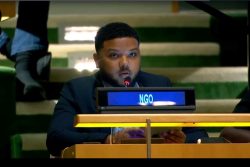By Fatimah Jackson-Best
Fatimah Jackson-Best is a Muslim woman, a researcher, and a writer. In addition to conducting Caribbean-based research on mental health she also writes a weekly column for the Singaporean Muslim women’s lifestyle e-magazine Aquila Style. Fatimah believes that we all have the right to good physical, spiritual and mental health.
 Several weeks ago I had an exchange online with a Muslim man who read an article I wrote on Muslim women’s leadership. I posted the article to a Barbadian Muslim-run Facebook group to spark dialogue about the current leadership in our local association. I pointed out that in most Muslim communities women’s work is a fundamental part of how our operations run successfully. Women play pivotal roles in the everyday functions and fundraising efforts of our Mosques, Islamic schools, and service organizations. Despite women being the backbones of our communities, they rarely receive the kind of recognition that well-known male Imams and scholars receive. Even rarer are Muslim women given leadership roles in the very organizations that they dedicate their time and energy to.
Several weeks ago I had an exchange online with a Muslim man who read an article I wrote on Muslim women’s leadership. I posted the article to a Barbadian Muslim-run Facebook group to spark dialogue about the current leadership in our local association. I pointed out that in most Muslim communities women’s work is a fundamental part of how our operations run successfully. Women play pivotal roles in the everyday functions and fundraising efforts of our Mosques, Islamic schools, and service organizations. Despite women being the backbones of our communities, they rarely receive the kind of recognition that well-known male Imams and scholars receive. Even rarer are Muslim women given leadership roles in the very organizations that they dedicate their time and energy to.
The conversation between me and this Muslim man was going pretty smoothly until he wrote, “The tone of the article is mildly revolutionary, and revolution is not from Islam. […] Men, know your limits. Do not hit the women more than it is permissible (a light tap on the hand with a miswak)”.
I was floored at this attempt to use the Qur’an to legitimise any kind of abuse towards women. When I called him out on this, he immediately said that he was against domestic violence, so I can only assume that he believes hitting a woman with a miswak (a small twig traditionally used from the Middle East to Southeast Asia to brush the teeth) is somehow outside of the boundaries of abuse. But he had in fact said this in a very public forum.
Weeks later, I found myself still thinking about this exchange and the bigger questions it brought up for me. One of these is about silence – only one person in the Facebook group spoke up to say that abuse of any kind against women is wrong. One single person.
I’m not sure if the other readers felt it wasn’t their business to intervene, but I can say with confidence that when it comes to abuse and domestic violence, silence can be deadly. About a week before this online discussion, a woman here in Barbados was killed by her partner in a parking lot which was just next door to a police station. I wondered how it was possible that no one heard her screams and came to her aid.
More recently the island was rocked by the death of another young woman who was brutally murdered by her boyfriend in her home. Again, I contemplated if her neighbours had heard any arguing and why no one tried to call the police. Across the Caribbean women are being murdered almost weekly by their husbands and boyfriends. Are people so concerned with maintaining notions of privacy that we have become deaf to the cries of women being assaulted and murdered by their partners in their own homes and in public places?
There was another much larger and more complex question that came out of this interaction on Facebook. Were people silent because some Muslims actually believe that it is within a Muslim man’s rights to hit his wife? When this man wrote his response to me, he immediately posted a link to a Qur’anic verse which states:
Men are in charge of women by [right of] what Allah has given one over the other and what they spend [for maintenance] from their wealth. So righteous women are devoutly obedient, guarding in [the husband’s] absence what Allah would have them guard. But those [wives] from whom you fear arrogance – [first] advise them; [then if they persist], forsake them in bed; and [finally], strike them (4:34).
This verse in the Qur’an is perhaps one of the hardest to discuss and it is precisely because of the way it has been translated and interpreted. The Qur’an itself was revealed in the Arabic language over 1400 years ago, and in a specific social and historical context. Since then it has been translated and interpreted into many languages, and mainly by male scholars. The Arabic language is known for having many meanings for some words, and there are certain words and phrases that do not have a literal English translation at all. This is where the interpretation of the word or phrase and consideration of the context would factor in to assist with the translation.
I vividly remember the first time I heard this verse in the Qur’an discussed. I was about 11 or 12 years old and my religious studies teacher in the Islamic school I attended in Toronto, Canada brought it up. He told us that a man striking his wife with a miswak was not to be done to hurt her but instead humiliate her into better behaviour. As a child I did not have the words to challenge him, but it always sat wrong with me. I also felt as though it was not my place to question his interpretation of the Quran and so I did not.
Perhaps the Muslims in this Facebook group also felt it wasn’t their place to question the Qur’an, even if they themselves claimed to be against domestic violence and spousal abuse. But in spite of their silence, we are still left with this interpretation of the verse and the reality that some men (and some women) use it to legitimise violence against women. So what should we do and how can we as Muslims confront this head-on?
I do not propose to have all the answers, but I can look to many examples from leaders in our communities for guidance. One of the most poignant voices on this topic comes from Dr Asma Barlas: a Muslim woman, researcher and academic, and one of the few who has confronted and interrogated the interpretation and use of this verse.
In her analysis, she writes that the word idhribuhunna comes from the Arabic root word daraba which has several meanings, including “to beat” and “to go away”. She points out that the first definition has been widely chosen by interpreters of the Qur’an who happen to be overwhelmingly male. To her, this has more to do with maintaining patriarchy and male dominance than the accuracy of language. Dr Barlas shows us that a literal translation doesn’t work here, and that context and education are essential in order to deal with the most controversial and difficult parts of our religion.
Another Muslim woman, Dr. Laleh Bakhtiar, who was the first American female to interpret the Qur’an has also weighed in on this verse. Dr. Bakhtiar does not dispute the Arabic wording, but like Barlas she also calls into question its English translation and interpretation. She echoes the alternate meaning of the word daraba and concludes that in this context it would mean “to go away”. She props up this interpretation by highlighting the behaviour of the Prophet Muhammad whose daily life and actions were a living example and interpretation of the Qur’an which was revealed to him from God. The Prophet Muhammad never hit any of his wives, and was always depicted as being kind and gentle with his spouses. As Muslims we are taught to emulate the last Prophet of Islam’s actions and behaviours, and if we truly wish to live in his image then a man would not ever raise a hand or miswak to his wife for fear of stepping outside of this example.
These two Muslim women challenging the interpretation of the verse do not overstep any boundaries; in fact their perspective is needed in the heavily male-dominated sphere of Islamic scholarship. Their contemporary analyses put to rest a long debated issue by using both common sense and intellect. Yet, their interpretation and reasoning hasn’t caught on with Muslims like the man who repeated this verse to me in the Facebook group. Perhaps it is because they are women and people are uncomfortable with female thought and expression in Islam which is a part of a bigger issue we have with authority, female leadership, and feminine perspectives on Islam and the Quran.
There are also numerous male Imams and Islamic scholars that have spoken out against domestic violence and abuse. Shaykh Hamza Yusuf, Imam Zaid Shakir, and Imam Khalid Latif are some notable public figures who have been outspoken against domestic violence in Muslim communities. Shaykh Faraz Rabbani even issued a fatwa (an Islamic legal judgment that can only be issued by a qualified Muslim leader) against all forms of domestic violence including physical, emotional, and spoken forms. We also see campaigns like Muslims for White Ribbon, a grassroots initiative in Canada working to end violence against women in Islamic communities. These examples send a clear message to Muslims that we cannot condone violence against women under any circumstances – including the use of any objects small or large.
Despite all this, we still have a very long way to go and much silence to overcome. And there will still be those people in our Muslim communities who claim that a husband hitting his wife lightly with a miswak is intended to humiliate her rather than abuse her. To those people I ask is humiliation not a part of domestic violence which leaves mental and emotional scars on women? Such justification is a part of bigger problems we have, and these explanations offer only weak excuses that abusers can fall back on. Rather than explaining away contentious areas or taking them at face value, it is essential for us to delve deeper into these discussions for our collective and personal spiritual growth. As Muslims we owe it to our religious communities and the wider communities we are a part of in Guyana, Barbados and around the world to honour women in the true spirit of the Qur’an and the example of the Prophet Muhammad.








